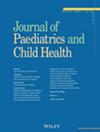Examination of the relationship between ABO/Rh blood groups and dietary compliance in children with coeliac disease: A single-centre experience
Abstract
Aim
Coeliac disease (CD) is an autoimmune enteropathy that develops upon ingestion of food containing gluten. The established link between ABO blood groups and numerous infectious and non-infectious illnesses prompted this investigation into blood group distribution and its relationship with dietary compliance among children diagnosed with CD.
Methods
In this retrospective study, patients with CD who were followed for ≥1 year at the paediatric gastroenterology outpatient clinic of our hospital were evaluated. History, physical examination and coeliac serology results were reviewed for each patient. Patients were divided into two groups based on self-reported compliance to a gluten-free diet: diet-adherent and non-diet-adherent. Patient and control groups were examined in terms of ABO blood groups.
Results
A total of 177 patients with CD were included in the study. A control group of 211 age- and sex-matched children without any chronic disease who had undergone blood group testing for various reasons was included for comparison. A total of 65% (n = 115) of the patients were girls, and 35% (n = 62) were boys. No significant relationship was found between CD diagnosis and ABO blood groups among patients (P = 0.559). Furthermore, the dietary compliance status of the patients was not associated with any specific blood group (P = 0.951).
Conclusion
No notable difference was found between patients with CD with or without gluten-free diet compliance in terms of the distribution of ABO blood groups and Rhesus (Rh) factor. Therefore, it can be inferred that all blood groups and subgroups carry an equal risk for CD.

 求助内容:
求助内容: 应助结果提醒方式:
应助结果提醒方式:


